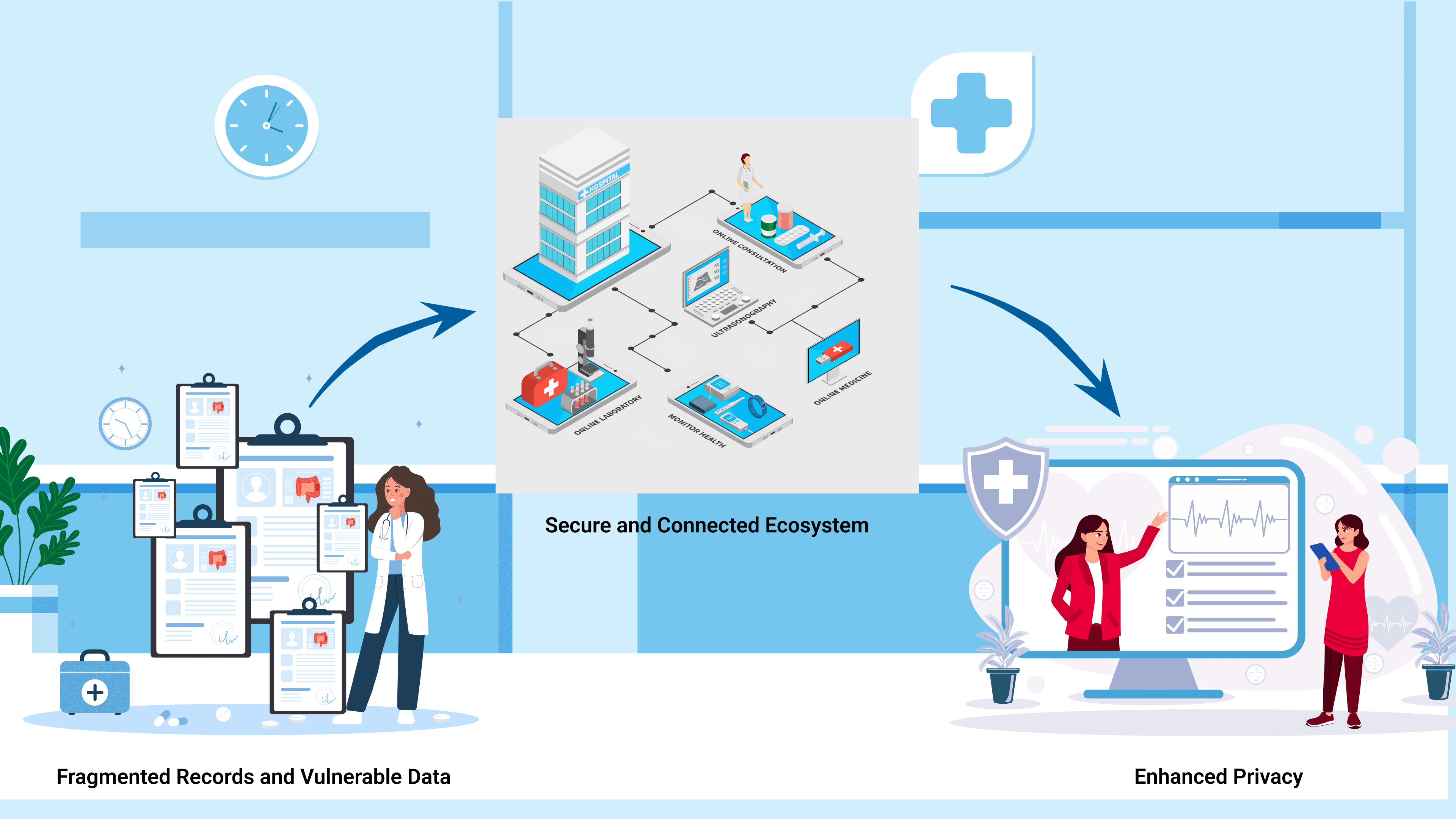CREDEBL is now a part of LF Decentralized Trust ecosystem! Click here to learn more.
CREDEBL is now a part of LF Decentralized Trust ecosystem! Click here to learn more.
Healthcare systems globally face challenges related to rising costs, fragmented systems, data security, medical errors, and supply chain issues. Traditional systems often rely on centralized databases, which are vulnerable to breaches and inefficiencies. Verifiable Credentials (VCs) offer a solution by allowing secure, verifiable, and decentralized sharing of patient information.
The Promise of Verifiable Credentials in Healthcare
Verifiable credentials represent a significant advancement in digital identity management, providing a decentralized and secure way to verify and share information. Within healthcare, VCs can improve data security -- including mechanisms for maintaining patient privacy and streamlining administrative tasks. We present a case study on how to develop and deploy VCs or self-sovereign data in a specific data context within healthcare that might be interesting for others to understand.
The Problem: Fragmented Records and Vulnerable Data
Patient medical records are often distributed across multiple health care organizations including hospitals, clinics, providers and payers. This fragmented collection of health data can prevent physicians from obtaining a complete picture of a patient’s health history and, potentially, result in a misdiagnosis or a delay in treatment.
Many health systems still rely on paper-based systems and files, which are at risk for being lost, destroyed, or even stolen.
Centralized data storage creates a single point of failure, making it vulnerable to cyberattacks and data breaches. Patients have little control over who accesses their information.
The Blockchain Solution: A Secure and Connected Ecosystem
Blockchain technology offers an innovative solution by creating a secure and distributed network for managing health data. Here’s how it works:
Each citizen receives a unique Health ID, a verifiable credential stored securely in their digital wallet. This ID links to their national ID record, ensuring authenticity. Under government schemes, patients can scan a QR code linked to their Health ID at the doctor’s office. The doctor’s system retrieves the patient’s history, and the government directly processes the payment, simplifying administrative tasks.
Patients can verify the credentials of their healthcare providers directly at the clinic by scanning a QR code. This process ensures that the doctor’s certifications are valid and current, promoting trust and transparency in the quality of care.
Health records are encrypted and stored on a secure, distributed ledger. This eliminates single points of failure, reducing the risk of unauthorized access or malicious attacks targeting centralized repositories.
When seeking medical attention, a citizen simply presents a QR code linked to their Health ID. The doctor's system verifies the ID and issues a temporary access token for their specific medical records. This token restricts access duration, ensuring data privacy.
Managing patient consent for research participation is complex and often insecure. A blockchain-based consent management platform allows patients to securely grant and revoke consent for participation in research studies, using VCs to manage consent preferences. Smart contracts enforce consent agreements, ensuring research organizations comply with patients' consent preferences throughout the study lifecycle. Cryptographic techniques such as zero-knowledge proofs enable selective disclosure of patient data, preserving privacy and confidentiality. Companies can use VCs to authenticate patient medical reports before enrolling them in clinical trials, ensuring eligibility and integrity of the research process.
Healthcare supply chain transparency faces challenges such as drug shortages, counterfeit medications, and lack of transparency. A blockchain-based supply chain tracking system records the provenance and distribution history of healthcare products using decentralized identifiers (DIDs) and VCs for identity management. IoT devices and sensors capture real-time data on the location and condition of products as they move through the supply chain, with data securely recorded on the blockchain. Smart contracts enforce supply chain agreements and automate processes such as product authentication and recall management, ensuring transparency and traceability.
Ambulance services can instantly validate driver licenses through verifiable credentials. This real-time verification ensures compliance with regulatory standards and enhances patient safety by confirming that drivers are properly licensed and qualified.
Benefits of Verifiable Credentials in Healthcare

Patients control who can see their Health ID. The doctor's system verifies the credential without needing to access the entire medical history.
Since the credential is cryptographically signed, it is impossible to forge or tamper with, eliminating the risk of someone impersonating a patient to access medical records.
Limited access tokens issued based on the verifiable credential ensure doctors can only access specific parts of a patient's medical history relevant to the current treatment.
Sharing medical history with different providers becomes effortless. Patients present a QR code, and the new provider can verify the Health ID and obtain temporary access with patient consent.
AYANWORKS specializes in delivering blockchain-based digital verifiable credential solutions to the healthcare industry. Our services are designed to address the sector's most pressing challenges, from patient identity verification to supply chain transparency. By leveraging the power of decentralized, secure, and verifiable data sharing, we aim to drive innovation and improve patient care.
By integrating VCs into healthcare, we can enhance data security, streamline administrative processes, and ensure accurate and efficient patient care. The future of healthcare lies in the adoption of advanced technologies like VCs, and AYANWORKS is committed to leading this transformation.